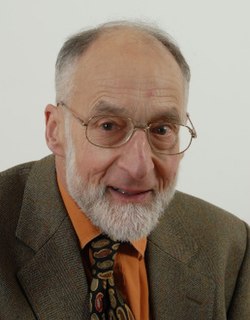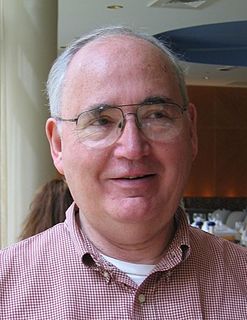Related Research Articles
LCF may refer to:
In computer science, denotational semantics is an approach of formalizing the meanings of programming languages by constructing mathematical objects that describe the meanings of expressions from the languages. Other approaches providing formal semantics of programming languages include axiomatic semantics and operational semantics.

Arthur John Robin Gorell Milner, known as Robin Milner or A. J. R. G. Milner, was a British computer scientist, and a Turing Award winner.

Dana Stewart Scott is an American logician who is the emeritus Hillman University Professor of Computer Science, Philosophy, and Mathematical Logic at Carnegie Mellon University; he is now retired and lives in Berkeley, California. His work on automata theory earned him the Turing Award in 1976, while his collaborative work with Christopher Strachey in the 1970s laid the foundations of modern approaches to the semantics of programming languages. He has worked also on modal logic, topology, and category theory.
Logic for Computable Functions (LCF) is an interactive automated theorem prover developed at Stanford and Edinburgh by Robin Milner and collaborators in early 1970s, based on the theoretical foundation of logic of computable functions previously proposed by Dana Scott. Work on the LCF system introduced the general-purpose programming language ML to allow users to write theorem-proving tactics, supporting algebraic data types, parametric polymorphism, abstract data types, and exceptions.
ISWIM is an abstract computer programming language devised by Peter Landin and first described in his article "The Next 700 Programming Languages", published in the Communications of the ACM in 1966.

The School of Informatics is an academic unit of the University of Edinburgh, in Scotland, responsible for research, teaching, outreach and commercialisation in informatics. It was created in 1998 from the former Department of Artificial Intelligence, the Centre for Cognitive Science and the Department of Computer Science, along with the Artificial Intelligence Applications Institute (AIAI) and the Human Communication Research Centre.
In logic, a logical framework provides a means to define a logic as a signature in a higher-order type theory in such a way that provability of a formula in the original logic reduces to a type inhabitation problem in the framework type theory. This approach has been used successfully for (interactive) automated theorem proving. The first logical framework was Automath; however, the name of the idea comes from the more widely known Edinburgh Logical Framework, LF. Several more recent proof tools like Isabelle are based on this idea. Unlike a direct embedding, the logical framework approach allows many logics to be embedded in the same type system.

In computer science, concurrency is the ability of different parts or units of a program, algorithm, or problem to be executed out-of-order or in partial order, without affecting the final outcome. This allows for parallel execution of the concurrent units, which can significantly improve overall speed of the execution in multi-processor and multi-core systems. In more technical terms, concurrency refers to the decomposability of a program, algorithm, or problem into order-independent or partially-ordered components or units of computation.
In computer science, the Actor model and process calculi are two closely related approaches to the modelling of concurrent digital computation. See Actor model and process calculi history.
In computer science, unbounded nondeterminism or unbounded indeterminacy is a property of concurrency by which the amount of delay in servicing a request can become unbounded as a result of arbitration of contention for shared resources while still guaranteeing that the request will eventually be serviced. Unbounded nondeterminism became an important issue in the development of the denotational semantics of concurrency, and later became part of research into the theoretical concept of hypercomputation.

Gordon David Plotkin, is a theoretical computer scientist in the School of Informatics at the University of Edinburgh. Plotkin is probably best known for his introduction of structural operational semantics (SOS) and his work on denotational semantics. In particular, his notes on A Structural Approach to Operational Semantics were very influential. He has contributed to many other areas of computer science.
In denotational semantics and domain theory, power domains are domains of nondeterministic and concurrent computations.
In computer science, Programming Computable Functions (PCF) is a typed functional language introduced by Gordon Plotkin in 1977, based on previous unpublished material by Dana Scott. It can be considered to be an extended version of the typed lambda calculus or a simplified version of modern typed functional languages such as ML or Haskell.
Matthew Hennessy is an Irish computer scientist who has contributed especially to concurrency, process calculi and programming language semantics.

Programming language theory (PLT) is a branch of computer science that deals with the design, implementation, analysis, characterization, and classification of formal languages known as programming languages and of their individual features. It falls within the discipline of computer science, both depending on and affecting mathematics, software engineering, linguistics and even cognitive science. It has become a well-recognized branch of computer science, and an active research area, with results published in numerous journals dedicated to PLT, as well as in general computer science and engineering publications.
The Royal Society Milner Award, formally the Royal Society Milner Award and Lecture, is awarded annually by the Royal Society, a London-based learned society, for "outstanding achievement in computer science by a European researcher". The award is supported by Microsoft Research and is named in honour of Robin Milner, a prolific pioneer in computer science who, among other contributions, designed LCF and the programming language ML.
Philippa Anne Gardner is a British computer scientist and academic. She has been Professor of Theoretical Computer Science at the Department of Computing, Imperial College London since 2009. She was director of the Research Institute in Automated Program Analysis and Verification between 2013 and 2016. In 2020 Gardner was elected Fellow of the Royal Academy of Engineering.
References
- ↑ Dana S. Scott. "A type-theoretical alternative to ISWIM, CUCH, OWHY". Theoretical Computer Science , 121:411–440, 1993. Annotated version of the 1969 manuscript.
- ↑ Robin Milner (1973). "Models of LCF"
- ↑ Plotkin, Gordon D. (1977). "LCF considered as a programming language" (PDF). Theoretical Computer Science. 5 (3): 223–255. doi: 10.1016/0304-3975(77)90044-5 .